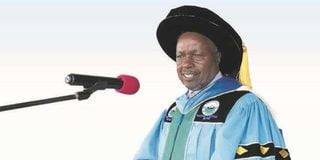Kabianga University to pay ex-UoN student Sh500,000 for use of photo in marketing

Vice-Chancellor of the University of Kabianga Prof. Wilson Kipngeno. A court has ordered the university to pay a former student Sh500,000 for using his image in online marketing.
A court has ordered University of Kabianga to pay a former University of Nairobi student Sh500,000 for using his image in online marketing and soliciting funds from a regional bank without his consent.
Sitting at the High Court in Kericho, Justice Asenath Ongeri declared that the university violated fundamental rights to privacy and human dignity by publishing an image of Mr Shimlon Mwangi Kuria without his express consent.
The judge also issued a permanent injunction restraining the University of Kabianga from publishing or using Mr Kuria’s image or likeness in its advertisement without his consent.
In his petition, Mr Kuria said the university used his image and persona in 2021 for marketing purposes to solicit funds from the African Development Bank.
He stated that the university’s action subjected him to psychological torture because society, peers, associates, family, business partners and affiliates perceive him to have graduated from Kabianga University.
Thus, concluding that he had been untruthful in his academic credentials from the University of Nairobi.
He said that he was pictured at a graduation ceremony at the University of Nairobi on December 20, 2019.
About one year later, the University of Kabianga published the said picture on its website inviting stakeholders to a webinar that was to be held on July 21, 2021.
The webinar was to validate a proposal for a pipeline project in partnership with the African Development Bank on how universities could be supported to cope/mitigate the challenge of Covid-19.
He alleged that the university had exploited his identity/image for commercial gain without his consent, hence invading his privacy contrary to Article 31 of the Constitution.
But the university denied being in a profit-making business.
Through Professor Wilson Kipng’eno, the university told the court that the petitioner’s picture as published on its website did not amount to infringement of his rights but rather portrayed him in a positive light as a graduate.
It maintained that Kuria lacked property rights over pictures taken during a public ceremony and that he did not show that the university used his image for commercial or other exploitative activities.
Urging for dismissal of the suit, the university added that the petition was not within the realm of a constitutional dispute to be determined by the High Court and that the same should have been litigated in a Small Claims Court or the Magistrate Court.





